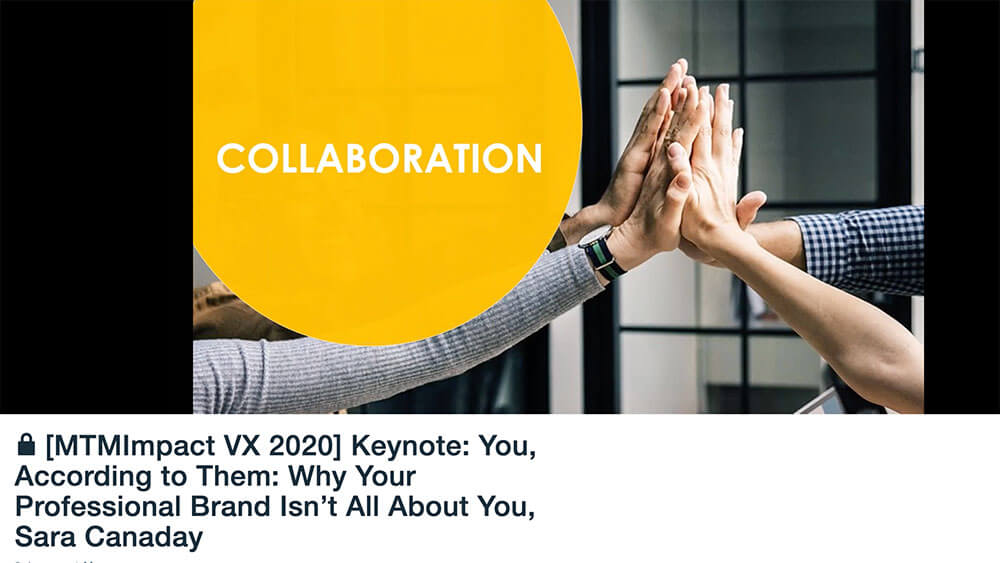
Using its webinar platform, Explorance is offering videos of sessions, including this keynote presentation, from a three-day meeting it converted into a virtual meeting due to the COVID-19 outbreak.
Top takeaways:
- Explorance, a Montréal-based global software company, converted a three-day meeting to a virtual meeting in one week, using its webinar platform. Registration for the virtual event was free and open to all.
- Concurrent sessions were eliminated from the virtual format in order to create a more straightforward schedule and ensure a seamless experience.
- Face-to-face and virtual events aren’t an either/or strategy. They are different learning modalities that, ideally, can be combined.
On March 4, Explorance, a global software company based in Montréal, made the difficult decision to cancel a three-day meeting that was planned to begin in just one week in New Orleans on March 11. Staff had been communicating with attendees what they were thinking about traveling to New Orleans, given the growing concerns around COVID-19, said Yeona Jang, the company’s chief community engagement officer. “Many of our customers said that they were expecting to encounter travel restrictions,” she said, and for the safety of their attendees, partners, and staff, “it seemed like a prudent thing to cancel.”

Yeona Jang
“We had not planned a virtual component to this event at all,” Jang added. But, Explorance, which creates software that helps business and academic organizations incorporate employee and student feedback into teaching and learning and business decisions, already offered their customers online learning through regular webinars. And a lot of work had already gone into putting the program together, by the Explorance staff and customers in their community. “We have the in-house expertise and know-how, as well as the process and technology infrastructure in place to mobilize,” Jang said. “We thought: ‘How about bringing them all together virtually?’”
When the decision to cancel was made at about 11 a.m. on March 4, Jang recalled, her staff took five minutes or so to feel disappointed about all the planning they had done for the in-person event — and then got to work organizing the virtual event. “Once we made the decision to cancel, work was nonstop, canceling venues and the hotel, and changing all the websites and different channels,” Jang said.
The meeting — renamed MTMImpact Virtual Experience — was held over the original in-person event dates, March 11–13. The online event originally was organized around a multi-track program, but the concurrent sessions were eliminated “to create a more straightforward schedule for our virtual attendees and ensure that we can execute a seamless experience for them,” Jang said. Along with keynotes and other presentations, Jang and her team worked out the logistics of putting a planned debate online. “It’s going to be interesting. We are going to experiment,” she told Convene before the event. The virtual conference, she said, was taking “a lot of coordination, a lot of learning. While we are doing, we are learning, too.”
“I felt like a movie director and producer dealing with many moving parts, as we executed the first-ever three-day virtual experience,” Jang added. Along with her team, every part of the business pitched in to make it work, including communication managers talking to their customers to get their “yes,” she said. “Customer engagement is one of the important aspects,” she said, of a virtual event.
Explorance automatically shifted registrations for the in-person 2020 conference attendees to a conference to be held in 2021 and provided information about attending the virtual conference, using the GoToWebinar platform. They also made the decision to make registration to the virtual event free and open to all, Jang said. “We thought, ‘As long as it is virtual, why not open it up to everyone?’”
Unlike meeting professionals whose are looking to develop digital skills, Jang’s education and experience are rooted in the digital world. She has a Ph.D. in computer science from MIT and an MBA from MIT’s Sloan School of Management and is an expert in online education. “I am passionate about education and helping others to learn and the online learning perspective,” she said.
“In adult learning, we found that different people have different learning styles and different work schedules,” she said. Explorance provides different modalities in terms of learning for their customers — some people do better face-to-face and some people do well with online learning, Jang added. “My team’s job is to help our customers learn together — our strategy is not either/or — we combine in-person gatherings with social relationship-based learning and virtual ones.” A quote from Helen Keller inspires Jang in her work combining online learning and group problem-solving, she said: “Alone, we can do so little; together we can do so much.”
One New Orleans–based part of the program did go on exactly as planned. As part of the registration process, attendees voted for their top three preferred nonprofit organizations, and Explorance donated $10,000 to Take Paws Rescue, which transports shelter animals in need of adoption; $5,000 to Covenant House New Orleans, which provides services to young people in in crisis; and $3,000 to SLCC Second Chance Corrections Education, which provides education to inmates in a local correctional facility.
“It’s who we are as a company,” Jang said. “We always support local communities — giving back to better our communities.”
This week, Jang and her team are editing videos at “warp speed,” and posting sessions online, with presenters’ approval, she said. Find the videos on MTMImpact’s Knowledge Base web page.
Barbara Palmer is deputy editor of Convene.
What Events Professionals Need to Know About COVID-19
PCMA has created a COVID-19 resources page to help event professionals find reliable information about the outbreak and to share events industry-related resources to ensure they are prepared.
